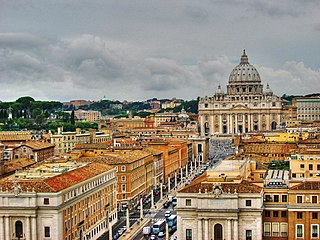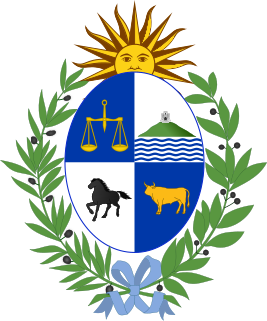Irreligion in Belgium pertains to citizens of Belgium that are atheist, agnostic, or otherwise unaffiliated with any religion. Irreligion is the second most common religious stance in Belgium, following Catholicism.
The Constitution of Belgium guaranteed the right to freedom of religion when it was enacted in 1831. Articles 19-21 provide for protections of secularism: the Constitution of Belgium guarantees the freedom of worship and its public practice, forbids the obligation of any religious practices, and disallows government intervention or involvement in a religion's leadership. [3]
The First School War was a dispute between Catholicism and secularism in schools in the 1880s. The dispute was revived in the Second School War in the 1950s. [4]
Religion has declined in Belgium, though Catholicism still remains large among the Belgian population. [5] [6] As of 2018, 29.3% of Belgians are irreligious. 20.2% of Belgians identify as not religious, while 9.1% identify as atheist. [7]
Due to pillarization which is in place in Belgium, irreligious individuals and families who desire to receive counseling and celebration for life moments often go to institutions of organized secularism, including secular organizations or liberal philosophical organizations (Dutch : vrijzinnige levensbeschouwelijke organisaties, French : organisations laïques) which are headed and led by clergy-like officials known as "counsellors".[ citation needed ]
Organized secularism is recognized by Belgium as a philosophy that exists alongside religious groups and receives state funding. [8]
Irreligion or nonreligion is the absence or rejection of religion, or indifference to it. Irreligion takes many forms, ranging from the casual and unaware to full-fledged philosophies such as secular humanism. Other examples are atheism, agnosticism and antitheism. Social scientists tend to define irreligion as a purely naturalist worldview that excludes a belief in anything supernatural. The broadest and loosest definition, serving as an upper limit, is the lack of religious identification, though many non-identifiers express metaphysical and even religious beliefs. The narrowest and strictest is subscribing to positive atheism.

Religion in Belgium is diversified, with Christianity, in particular, the Catholic Church, representing the largest community, though it has experienced a significant decline since the 1960s. However, according to the Eurobarometer poll carried out by the European Commission in December 2018, the share of Christians increased by 10% points from 52.5% in 2009 to 62.8% in 9 years, with Catholicism being the largest denomination at 57.1%. Protestants comprised 2.3% and Orthodox Christians comprised 0.6%. Non-religious people comprised 29.3% of the population and were divided between those who primarily identified as atheists (9.1%) or as agnostics (20.2%). A further 6.8% of the population was Muslim and 1.1% were believers in other religions. On the other hand, the following Eurobarometer's survey done in May and published in September 2019 showed Christians decreased from 62.8% in 2018 to around 60% in 2019, with Catholics at 54%, Protestants at 3%, Orthodox Christians at 1%, other Christians at 2%, Shia Muslims at 2%, Sunni Muslims at 2%, other Muslims at 1%, irreligious at 31% and other religions at 4%.

State atheism is the incorporation of positive atheism or non-theism into political regimes. It may also refer to large-scale secularization attempts by governments. It is a form of religion-state relationship that is usually ideologically linked to irreligion and the promotion of irreligion to some extent. State atheism may refer to a government's promotion of anti-clericalism, which opposes religious institutional power and influence in all aspects of public and political life, including the involvement of religion in the everyday life of the citizen. In some instances, religious symbols and public practices that were once held by religion were replaced with secularized versions. State atheism can also exist in a politically neutral fashion, in which case it is considered as non-secular.

Religion in Europe has been a major influence on today's society, art, culture, philosophy and law. The largest religion in Europe is Christianity, but irreligion and practical secularisation are strong. Three countries in Southeastern Europe have Muslim majorities. Ancient European religions included veneration for deities such as Zeus. Modern revival movements of these religions include Heathenism, Rodnovery, Romuva, Druidry, Wicca, and others. Smaller religions include the Dharmic religions, Judaism, and some East Asian religions, which are found in their largest groups in Britain, France, and Kalmykia.

There are many active religions in Luxembourg.
Accurate demographics of atheism are difficult to obtain since conceptions of atheism vary considerably across different cultures and languages, ranging from an active concept to being unimportant or not developed. In global studies, the number of people without a religion is usually higher than the number of people without a belief in a deity and the number of people who agree with statements on lacking a belief in a deity is usually higher than the number of people who self-identify as "atheists".

Religion in Sweden has, over the years, become increasingly diverse. Christianity was the religion of virtually all of the Swedish population from the 12th to the early 20th century, but it has rapidly declined throughout the late 20th and early 21st century.

Religion in the European Union is diverse. The largest religion in the EU is Christianity, which accounted for 72.8% of EU population as of 2018. Smaller groups include those of Islam, Buddhism, Judaism, Hinduism, and some East Asian religions, most concentrated in Germany and France. Also present are revival movements of pre-Christianity European folk religions including Heathenism, Rodnovery, Romuva, and Druidry.

The dominant religion in Slovenia is Christianity, primarily the Catholic Church, the largest Christian denomination in the country. Other Christian groups having significant followings in the country include Eastern Orthodoxy and Protestantism (Lutheranism). Islam, Judaism and Hinduism are small minorities in Slovenia. About 18% of the population are either agnostic or atheist.

The predominant religion in the Republic of Ireland is Christianity, with the largest denomination being the Catholic Church. The Constitution of Ireland says that the state may not endorse any particular religion and guarantees freedom of religion.

Christianity is the largest religion in Uruguay with Catholics having the most adherents, but over 37% of the population is irreligious. Church and state are officially separated since 1916.

The main religion traditionally practiced in Latvia is Christianity. As of 2011, it is the largest religion (80%), though only about 7% of the population attends religious services regularly. Lutheranism is the main Christian denomination among ethnic Latvians due to strong historical links with the Nordic countries and Northern Germany, while Catholicism is most prevalent in Eastern Latvia (Latgale), mostly due to Polish influence. The Latvian Orthodox Church is the third largest Christian church in Latvia, with adherents primarily among the Russian-speaking minority.
Irreligion in Spain is a phenomenon that has existed since at least the 17th century. Secularism became relatively popular in the late 19th and early 20th centuries, often associated with anti-clericalism and progressive, republican, anarchist or socialist movements.
Atheism, or irreligion in Indonesia, is uncommon among the country's inhabitants, as there is a great stigma attached to being an atheist in Indonesia and it is widely condemned by the Indonesian people.
China has the world's greatest irreligious population, and the Chinese government and the ruling Chinese Communist Party (CCP) is officially atheist. Despite limitations on certain forms of religious expression and assembly, religion is not banned, and religious freedom is nominally protected under the Chinese constitution. Among the general Chinese population, there are a wide variety of religious practices. The Chinese government's attitude to religion is one of skepticism and non-promotion.

Irreligion in Bulgaria pertains to atheism, agnosticism, and secularism among the citizens of Bulgaria. Irreligion is a minority religious position in Bulgaria. Making up approximately 5-10% of Bulgarians, irreligion is the third most common religious stance after Eastern Orthodoxy and Islam. Irreligion in Bulgaria is closely tied to the history of Marxism–Leninism and Soviet rule in the country during the 20th century.
Irreligion in Italy includes all citizens of Italy that are atheist, agnostic, or otherwise irreligious. Approximately 12% of Italians are irreligious, and no affiliation is the second most common religious demographic in Italy after Christianity.
Freedom of religion in Montenegro refers to the extent to which people in Montenegro are freely able to practice their religious beliefs, taking into account both government policies and societal attitudes toward religious groups. Montenegro's laws guarantee the freedom of religion and outlaw several forms of religious discrimination, as well as establishing that there is no state religion in Montenegro. The government provides some funding to religious groups.
The status of religious freedom in North America varies from country to country. States can differ based on whether or not they guarantee equal treatment under law for followers of different religions, whether they establish a state religion, the extent to which religious organizations operating within the country are policed, and the extent to which religious law is used as a basis for the country's legal code.
Irreligion in Peru refers to atheism, deism, religious skepticism, secularism, and humanism in Peruvian society. According to article 2 of the Peruvian Constitution: "No person shall be persecuted on the basis of his ideas or beliefs". According to the 2017 Peruvian Census data, 1,180,361 Peruvians or 5.1% of the population older than 12 years old describes themselves as being irreligious, but some sources put this number higher at 8.2%.